From local ski hills to the PyeongChang Olympics, the U.S. Ski and Snowboard Association (USSA) encompasses all athletes that share a passion for skiing and snowboarding. We explore what makes each skier and rider a champion with stories from the U.S. Ski Team, U.S. Snowboarding and U.S. Freeskiing, next to kids winning a NASTAR medal, landing their first cork 7 or joining a club team. Alongside USSA’s mascot Champ, take a look at how all of these athletes strive to be Best in the World.
As we continue to explore what makes USSA athletes champions, we’re learning more than we ever expected. To be a champion is holistic – it goes beyond the medals and the titles. It’s someone with great character and an undying belief in themselves; it’s someone who loves their sport with an unmatched passion—whether they’re still actively pursuing it or not. We are honored to share these stories with you. In this installation, Content Manager Courtney Harkins sits down with U.S. Ski Team alumnus Cody Marshall to discuss #WhatMakesAChamp.
You may have heard of Cody Marshall because of his mile-long list of skiing accolades—including winning NorAm titles and podiuming at Europa Cups. Or you might be familiar with his family—well-known in the ski racing world with two of his three siblings also having made the U.S. Ski Team.
Or, if you’ve heard of Cody Marshall, it might be because of his accident a few years ago. And it’s not easy to forget; he sports a glaring reminder on the top of his shaved head—a thick scar that stretches from the top of his forehead to the back of his skull.
“It effectively ended my skiing career,” Marshall said. “It was a stupid mistake that had huge consequences.”
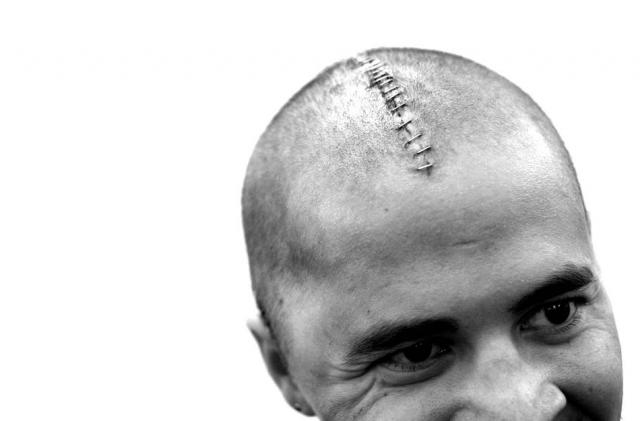
Marshall was horsing around with friends on a broken-down escalator late at night in Park City in 2009 when he fell three stories to the ground, crushing his skull. He was rushed to the hospital, where he lay in a coma—his family unaware if he would ever come out of it.
But with boundless determinism he was well-known for in ski racing, Marshall woke up. And little by little, he recovered, shattering every goal the doctors set for him. But it wasn’t enough for him.
“A big thing for me after my head injury was dealing with the changes and limitations that come along with sustaining massive brain trauma,” said Marshall. “Things were never going to be the same and I had to learn to accept that. I needed to re-understand who I was and part of that was ski racing.”

Cody lies in the hospital after his accident in 2009.
He attempted a comeback, but his processing speed was different. “It’s like your internet is really slow. It was noticeable,” said Marshall. “I was in touch with my body, but the biggest thing for me was I knew I wasn’t going to be able to take a lot of risk and put myself on the line physically. I’m much more calculated now.”
He finished his skiing career on a high note, winning two USSA races at Snowbird. But, ski racing was what he knew—he’d been racing since he was 10—and he started coaching with the Park City Ski Team. Soon after, he met Bob Bennett, a local guy who owns a financial firm and wanted to be a competitive ski racer. Bob offered to pay Cody to coach him.
“So, I started private coaching him,” said Marshall. “We would drive back and forth to camps and races, and eventually we got bored of just talking about skiing. So we started talking about business.”
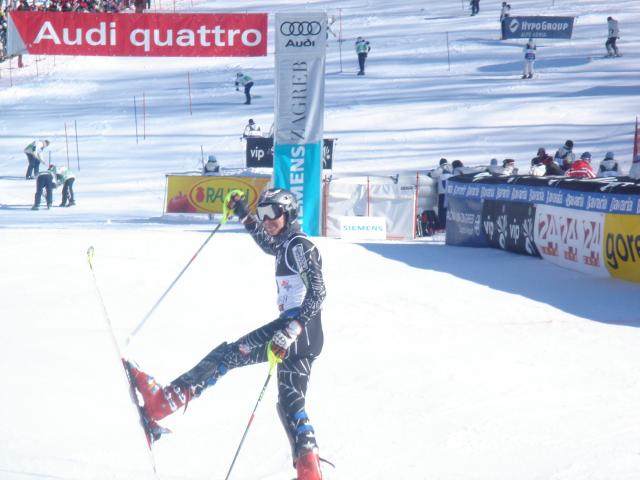
Cody smiles in the finish at Zagreb in 2008 after scoring World Cup points.
Bennett owns a private equity firm called GroundSwell Resources, but was working on a side project to teach college-aged kids about finance and private equity. It was a boot camp format with an apprenticeship-like model, in which students would finish the school and have the potential to buy a business and run it with Bob, or get job placement opportunities with businesses needing their skills. They’d do between 800-1000 hours of class time, and in conjunction, be working hands-on with real companies on the scenarios about which they were learning. Marshall volunteered to be Bennett’s test subject.
“I stopped the traditional education model when I was 11 years old,” said Marshall. “I was mostly homeschooled while ski racing. So this nontraditional program made sense to me.”
With the gritty resolution Marshall is known for, he jumped in and started learning from Bennett. His first project using his newly acquired skills was working with Bryon Friedman (read Bryon’s #WhatMakesAChamp profile here) and his company SoulPoles. “I did consulting work with Bryon through GroundSwell and helped him implement the strategies we came up with,” said Marshall. “This process makes it interesting as a student and incredibly effective. There’s a balance between structure and freedom of actually doing something.”
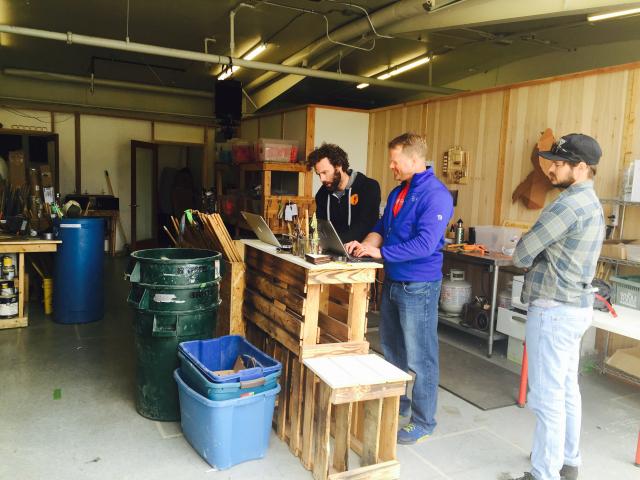
Bob Bennett and Bryon Friedman review Cody's analysis of SoulPoles time-driven manufacturing labor costs.
It was an ideal program for Friedman, as well. “We’re a big manufacturing business, so we have a lot of labor costs. GroundSwell and Cody helped me truly understand those costs and how I could make things more efficient—or at least plan for true costs through specific processes,” relayed Friedman. “He took the time to truly get granular. I use his findings every day.”
Firsthand, Marshall saw the influence this program had on him and realized it could be productive for other athletes that wanted to balance their goals as a ski racer with the development of a career. Enter GroundSwell Athletics—an offshoot of Bennett’s newly formed boot camp. Marshall realized that he could take postgraduates—athletes who had finished going to high school, but weren’t quite at the level to make a D1 ski racing program or walk on to the U.S. Ski Team, as well as college graduates who were looking to continue to ski race—and train them in both skiing and finance.
“I was talking with Bob about the challenges of being a ski racer, his business and how quickly I could learn it and how enjoyable it was,” said Marshall. “The opportunity was pretty crazy. Why don’t we offer this same program to PG skiers to address the issues that a PG athlete faces?”
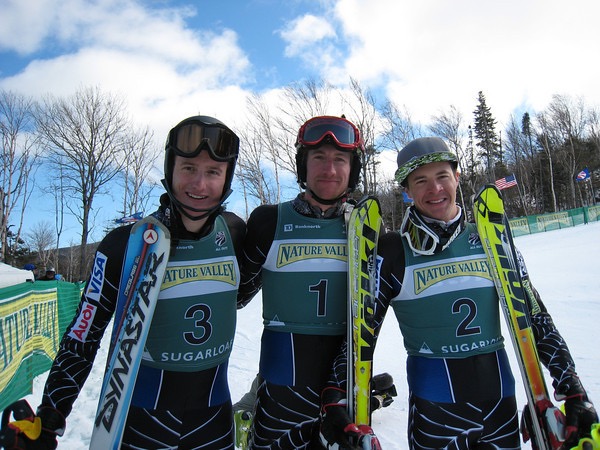
Cody (right) stands on the 2008 U.S. Alpine Championships slalom podium with Tim Jitloff (left) and Jimmy Cochran.
So, Marshall launched GroundSwell Athletics—a combination of skiing and school addressing the challenges that are associated with 'taking time off' to be a ski racer. “We’re giving student athletes the ability to combine skiing with education in business through a scenario-based and experience-based learning method,” described Marshall. “Plus, the program helps manage the risk of not finding a job after finishing school and a ski racing career.”
This will be the first year that GroundSwell Athletics will be in action. The athletes will train for four hours a day under Marshall, an experienced coach. Then the skiers will go into the classroom. Depending on the time of year, it’ll be between two and six hours a day of class time. Bennett will be teaching, as will Marshall.
“I didn’t know what I was going to do when I was done with the ski team,” said Marshall. “I was focused on being a ski racer and going after that dream. I want to address that question for these athletes, and help them in that transition.”
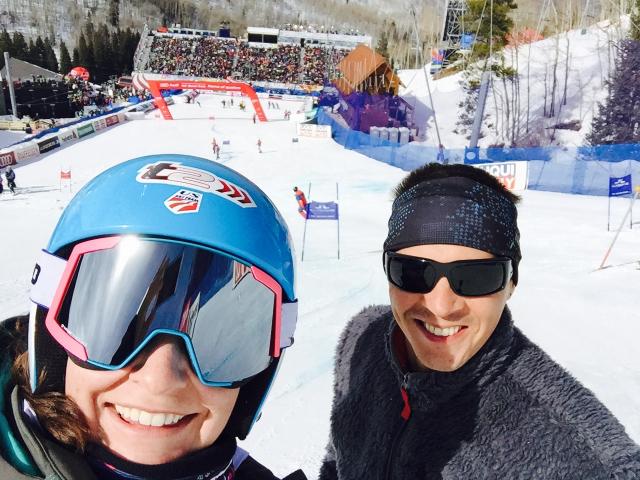
Cody smiles with current USA racer--and his girlfriend--Megan McJames.
Julie Glusker, who heads up USSA’s Athlete Career and Education program is equally as enthusiastic about the program’s potential. “We are really excited about the opportunities that GroundSwell Athletics could bring to our athletes. The programs and content could be really relevant and impactful for driven, motivated, goal-setting athletes,” said Glusker. “This allows our athletes, who are individually minded, to engage in more of an organization and something beyond sport.”
Marshall has come a long way. From being given a 50-percent chance of living to holding a successful role in the financial world, he truly embodies becoming a champion outside of the sport, while intertwining his passion for ski racing. We asked him our three questions on what he believes makes a champion.
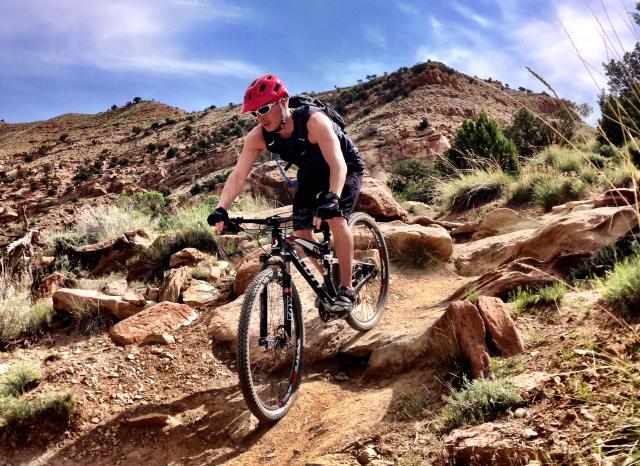
Cody continues to send it, whether skiing, mountain biking or starting businesses.
U.S. SKI TEAM: In your words, what makes a champion?
CODY MARSHALL: Belief, support, patience, and strategy. Figure out what your goals are, what's important for achieving them and then do everything you can to make them a reality. In business, there are three questions that are crucial to a company understanding its business foundation and strategy: who are you, where are you going and how are you different. I think these questions apply to anyone who is setting goals and pursuing success.
U.S. SKI TEAM: Do you remember the first time you felt like a champion?
CM: That's a difficult question. I can't recall feeling like a champion while I was ski racing. I had good days and milestone performances but I always wanted to do better. On the day of my first World Cup points, I was thinking about the mistakes I made second run that kept me from making the top 10 that day. After my ski career ended, someone told me I had a great career and I thought for the first time, ‘yeah I did.’
U.S. SKI TEAM: What is the biggest piece of advice you have for U.S. Ski Team athletes who want to be sitting where you are today?
CM: I was always very determined to be a World Cup ski racer. I started taking time off of school when I was 11 years old so I could spend more time on the mountain. I decided (with my parents and teachers) that five days of school a week was too much. I ended up attending school for three days a week and skiing the rest of the time. I spent six years skiing as a post-graduate before I qualified for the U.S. Ski Team. Eventually I skied on to the World Cup team and became one of the best slalom skiers in the world. Two things that come to mind when thinking about what gave me the perseverance to work towards my goals: determination and belief. I think it’s hard, if not impossible, to have one without the other. I knew that it was what I wanted and I knew it was possible. Believe in yourself and stay foolishly determined to fulfill your dreams.
If you are interested in learning more about GroundSwell Athletics as an athlete or student, or you are business owner interested in sponsoring a GroundSwell Athletics student intern at your company, please contact Cody Marshall at cody@groundswellinc.com. You can find out more about GroundSwell at www.groundswellinc.com
